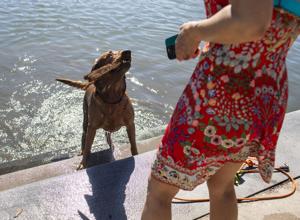An evening stroll around Colonial Lake reveals Charleston at its finest. The salty sea breeze from the nearby Ashley River rustles the leaves of Palmetto trees climbing with pink Peggy Martin Roses. A young family casts a fishing rod at the tidal pond's edge.
Sweat glistens as runners trek around the nearly 1-mile loop bordered by lush grasses and vibrant flora. Others sit and read, or simply bask in the gorgeous view. But a barren stretch just off bustling Broad Street hints at some of the city’s woes as well.

Story continues below Back-to-back storms felled an oak and a pair of hackberry trees leaving the plants that had been living under their shade exposed to the Holy City's harsh sun. Invasive ruellia, or wild petunias, overran beds where other plants drowned in salt water from frequent flooding. The Charleston Parks Conservancy has already begun clearing some of the more aggressive plantings in preparation for a two-year, $125,000 restoration project at Colonial Lake to make the park more resilient in the face of climate change.
The conservancy is a nonprofit partner that helps the city maintain the horticulture at 25 of the city's 125 parks. "I think that a lot of people, when we talk renovation, they're thinking we're gonna like rip out every single plant in there. It's not like that at all," said Kate White, the director of horticulture.
"We're just doing a lot of editing." White said the conservancy is hoping to find a balance between sustainable, native plants th.
















